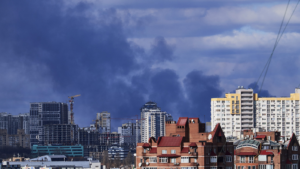The CSJ Center for Reconciliation and Justice will host its 13th annual symposium co-sponsored by the Institute for Business Ethics and Sustainability titled “Cry of the Earth, Cry of the Poor: The Issue of Water.” The event will be held over a span of three days — Tuesday, Jan. 30 through Thursday, Feb. 1 — with 17 in-person sessions highlighting different aspects of this issue. “There’s 17 events because once a topic is understood as something that we want to focus on, then we look at it from multiple perspectives and you’ll see that reflected in the CSJ,” shared Jeffrey Thies, D.Min., clinical associate professor of management and director of the Institute for Business Ethics and Sustainability.
“It’s a project that’s been developing since before COVID-19, and to see it so close to reality is special,” shared Josh Petteruti, ASLMU vice president of sustainability and operations. Petteruti will be moderating a 90-minute session on campus-wide composting. “LMU could become one of the first urban campuses in the country to divert 100% of its organic waste from landfill, which is critical as organic matter in landfills ultimately creates methane, a powerful greenhouse gas,” he said. “This session [“Closing the Loop: In-vessel Composting at LMU] will dive into the specifics of LMU’s plan, including where composting will take place, the facilities and staff powering it and how students will ultimately be involved,” stated Petteruti.
“Issues related to water are timely and contentious, especially in the western U.S. and other parts of the world affected by climate change,” said Judith Royer, C.S.J, Ph.D., director of the CSJ center. “They impact our livelihoods, politics, economics, health, even our mental and spiritual well-being. In our 2024 symposium, we invite the University community and general public to explore the issue of water in our time, especially as it relates to access and agriculture, commerce and urbanization, sustainability and dignity of life.”
The symposium will play another role this year as it will be the public launch for LMU’s commitment to the Laduato Si’ Action Platform, “a global initiative inspired by Pope Francis’ encyclical On Care of Our Common Home (Laudato Si’) that will guide our journey to ecological renewal by 2030,” said Royer. LMU President Timothy Law Snyder will be presenting the keynote on the first day of the session, Jan. 30, to mark the official launch.
The issue of water and our relationship with it can be traced back to centuries ago, noted Eric Strauss, Ph.D., professor of biology and executive director of the Center for Urban Resilience. “The most critical natural resource that we have on the planet is water, and as the climate is changing and the globe is heating, the places where water is found is changing” he stated.
The human body is composed of 60% water, so it’s natural for the issue of water to be a pressing one. “We need a constant supply of water; it’s not something we can even go days without,” shared Strauss. “As we think about California’s economy, we have the largest agricultural economy in the United States, and it is entirely leveraged on water from the delta and water form other rivers — and those resources are being depleted,” he stated.
“I don’t think people realize how serious of a threat drought is in general, but especially in [Los Angeles] — a city that gets its water from a river multiple states away,” added Petteruti. “Water conservation is truly an existential imperative for all of us, and it’s only going to get more important in the coming decades as climate change worsens. Climate change resilience requires adaptation, and we need to adapt fast.”
Thies will be introducing a few speakers and facilitating further dialogue and a Q&A at some of the 17 in-person sessions. “We thought it would be a really great opportunity to have both Doug Walters, [chief sustainability officer for the city of LA] and Christina Johnson, who is an environmental engineer at the Hyperion water facility [Hyperion Water Reclamation Plant], come to speak to us about the work that’s being done,” shared Thies.
Thies referenced several new plans such as Los Angeles’s Green New Deal and the need to highlight and involve oneself in local initiatives. “It would be really important for us to understand really significant and successful initiatives that are overseen locally, so that means that the work on water reclamation. How do we really understand that, and what is that work? And specifically, understanding the important work done by the [Hyperion Water Reclamation Plant], which is literally in our backyards,” he added.
LA has added quite a few water stewardship goals — most significantly, the city has created a new goal where 70% of all water consumed in LA will be locally sourced by 2035. “That’s really significant in an area that struggles with [not receiving] a lot of rain … and that receives much of its water from Northern California and from the Colorado River,” acknowledged Thies.
What does this mean? “This doesn’t mean we should stop being human or we should stop expanding, but we need to be aware of how we’re doing so we can reduce our impact and more equitably share the resources,” concluded Strauss.
For more information regarding the specific sessions for this year’s symposium, visit the CSJ 2024 symposium website.




